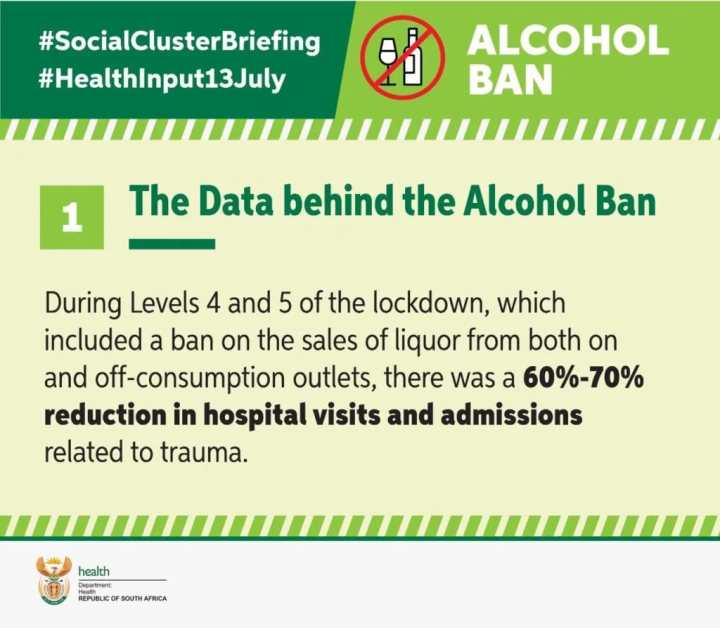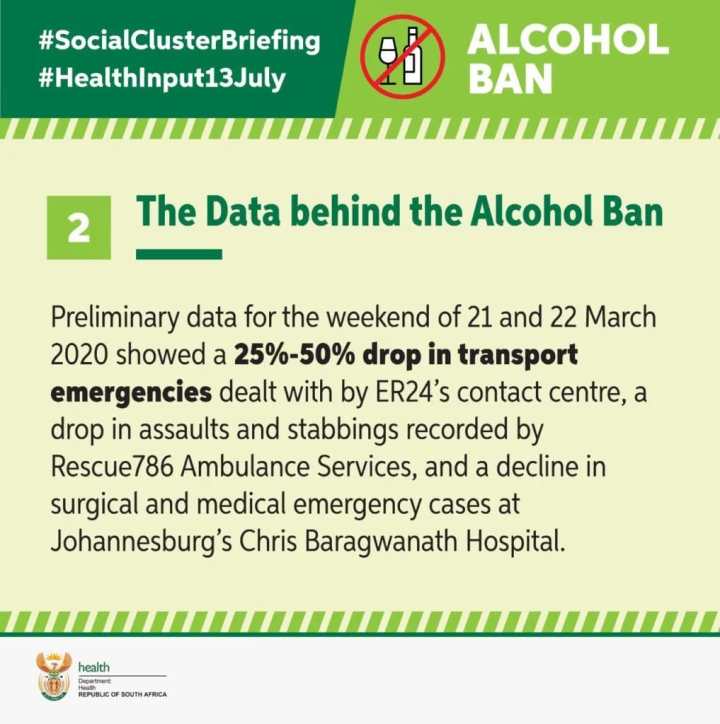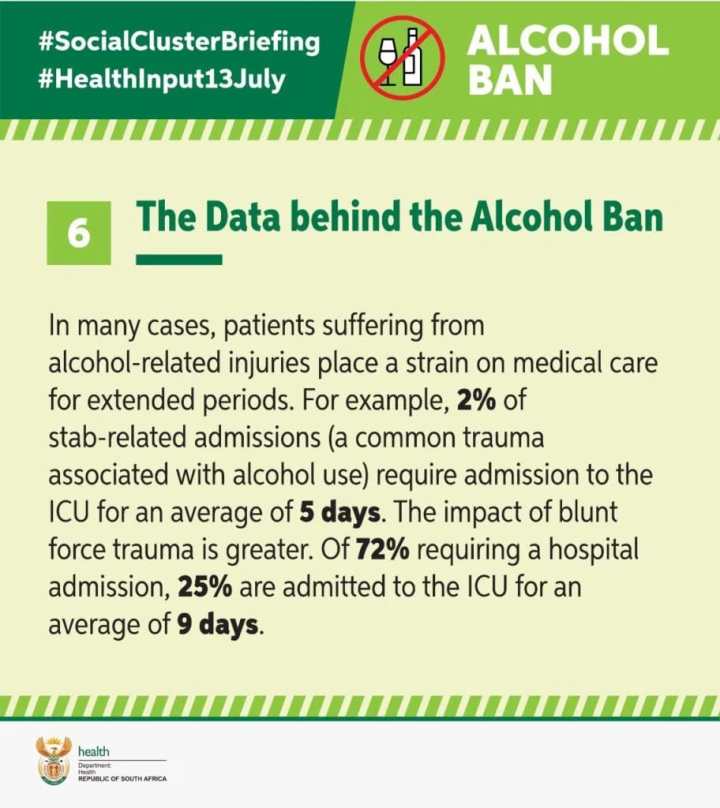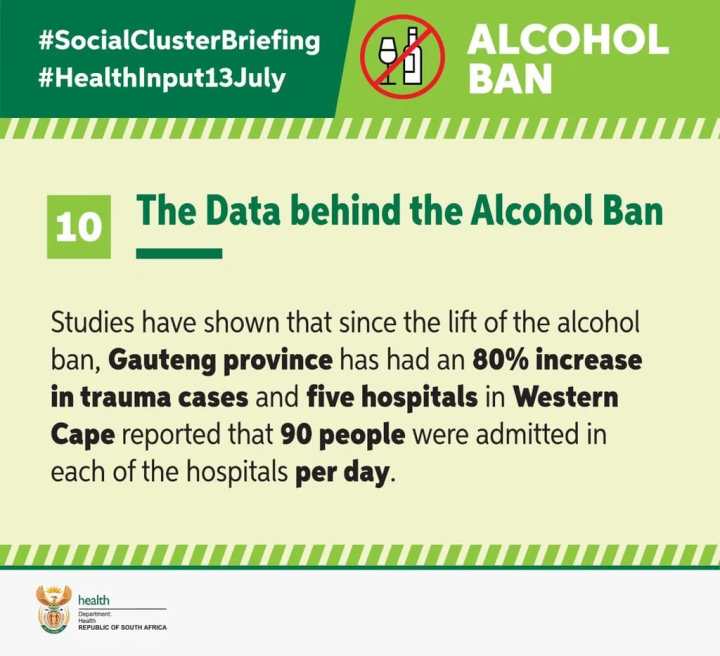LOCKDOWN PROHIBITION
Mkhize defends return of alcohol ban

Stricter Level 3 restrictions are upon us, signalling the return of the infamous alcohol ban. Health Minister Zweli Mkhize gave sobering statistics behind the second wave of prohibition and how going dry might ease the burden on healthcare facilities as South Africa hits its Covid-19 peak.
Health Minister Zweli Mkhize defended the return of the alcohol ban, saying it was evidence-based and would ease pressure on hospitals as South Africa hits the peak of the Covid-19 pandemic.
During a government social cluster briefing on Monday 13 July, which included Social Development Minister Lindiwe Zulu, Mkhize said many might have been “surprised” by the decision announced by President Cyril Ramaphosa on Sunday evening, but contended that alcohol-related trauma cases were taking up much-needed hospital beds and medical resources.
“During the Level 4 and the Level 5 lockdown, a study… showed that there was a 60-70% reduction in trauma admissions,” said Mkhize.
But when restrictions were lifted under Level 3 the numbers shot up.
“Facilities reported up to 60% increase in trauma emergency centre admissions and up to 200% increase in ICU trauma admissions,” said Mkhize, who was battling a cough.
Dressed in his signature black suit and with a furrowed brow above his square glasses, Mkhize continued to push home the sobering statistics on South Africa’s high booze consumption.
“Studies have revealed that we unfortunately do not have a healthy relationship with alcohol.”
According to a 2018 World Health Organisation global status report, only 31% of South Africans 15 years and older are drinkers, but despite the low proportion, “we are one of the countries that drink the most in the WHO Afro region,” he said.
Another concern was the country’s high percentage of binge-drinkers. Fifty-nine percent of drinkers over the age of 15 in South Africa reportedly engage in “high episodic drinking,” said Mkhize.
Some of the slides released in defence of the alcohol ban.
Statistical modelling showed that reintroducing the alcohol ban could result in a 20% reduction of all hospital trauma admissions and a 40% reduction of all alcohol-related trauma admissions by the third week of prohibition.
“Each trauma case does not just take up a bed – it takes up staff, oxygen, medicines and other critical resources necessary for the management of Covid-19.”
The minister listed motor vehicle accidents, gunshot wounds and “penetrating wound injuries” as some of the alcohol-related traumas.
“We think it would be inexcusable to end up with beds blocked by something that is as completely preventable and avoidable as the consumption of alcohol.”
Mkhize reminded South Africans that neither a vaccine nor cure exists for Covid-19, although vaccine trials are currently underway, including one in South Africa.
“It’s going to take us more than a year and a half to two years before those processes mature.”
He said the return of the curfew was partially related to alcohol use and nighttime activities which could result in physical injury through interpersonal violence and motor vehicle accidents.
“We are pleading for understanding and for patience as we try and navigate through this difficult time in the country.”
Taxi restrictions
Mkhize also touched on the health aspects of the newly gazetted regulations for the taxi industry, which has felt the financial sting of being forced to carry reduced passenger loads.
He said studies from South Korea and China showed that the virus spreads very quickly between people sitting in a confined space for more than 20 minutes, and that air conditioners spread the virus beyond a metre.
The coronavirus can survive for a number of days on metal surfaces, which people in taxis are likely to come in contact with, said Mkhize.
“It must be noted that people most at risk are those spending the most time in the taxi – drivers and conductors.”
The Department of Health has recommended that taxis only carry 70% capacity for long distances, but are allowed 100% capacity for shorter trips.
These are the guidelines for the taxi industry:
- Drivers and conductors should complete a daily symptom check before being allowed to drive a taxi.
- Drivers, conductors and passengers should at all times wear a mask.
- Drivers and conductors should practise physical distancing when out of their taxis, especially at taxi ranks.
- The driver’s, conductor’s and passengers’ windows should be opened sufficiently to allow substantial airflow across the front seats of the taxi.
- The taxi interior and surfaces, such as door handles, should be wiped down at least once each day.
- Drivers should ensure that passengers are kept at 1m apart in queues at the rank while waiting to board their transport. DM
"Information pertaining to Covid-19, vaccines, how to control the spread of the virus and potential treatments is ever-changing. Under the South African Disaster Management Act Regulation 11(5)(c) it is prohibited to publish information through any medium with the intention to deceive people on government measures to address COVID-19. We are therefore disabling the comment section on this article in order to protect both the commenting member and ourselves from potential liability. Should you have additional information that you think we should know, please email [email protected]"












 Become an Insider
Become an Insider